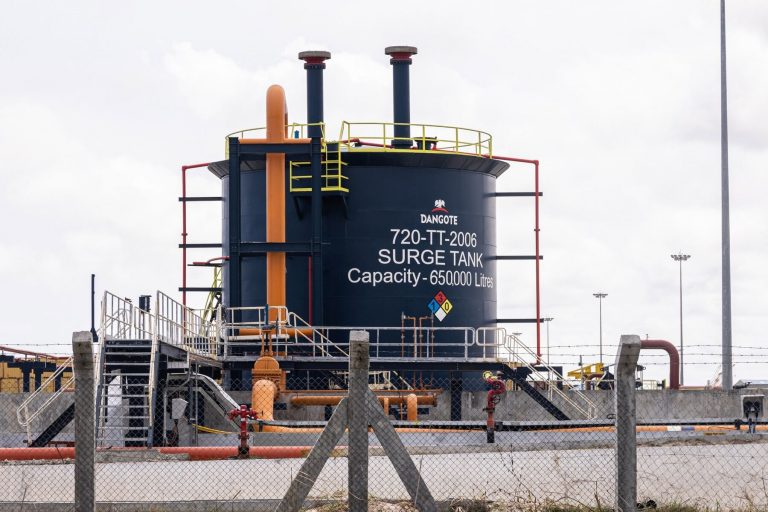
Ghana National Petroleum Authority (NPA) has expressed interest in sourcing petroleum products from Nigeria’s Dangote Petroleum Refinery, a shift that could reduce Ghana’s dependency on more costly imports from Europe.
Mustapha Abdul-Hamid, Chairman of the NPA, made the announcement on Monday during the OTL Africa Downstream Oil Conference held in Lagos, Nigeria. Abdul-Hamid explained that the Dangote refinery, currently Africa’s largest, offers a promising alternative that could save Ghana up to $400 million monthly in freight costs and improve its fuel supply chain.
The Dangote Petroleum Refinery, Africa’s largest refinery, with an impressive production capacity of 650,000 barrels per day (bpd), commenced operations in early 2024. It began by producing diesel and aviation fuel and officially announced the start of crude oil refining in September.
Tekedia Mini-MBA edition 16 (Feb 10 – May 3, 2025) opens registrations; register today for early bird discounts.
Tekedia AI in Business Masterclass opens registrations here.
Join Tekedia Capital Syndicate and invest in Africa’s finest startups here.
This scale of production positions the refinery to not only meet domestic needs but also supply fuel to regional markets. For Ghana, this development presents a unique opportunity to diversify its supply sources, particularly as Europe’s exports, primarily from Rotterdam, have long been an expensive lifeline for the country.
“If the refinery reaches 650,000 bpd a day capacity, all that volume cannot be consumed by Nigeria alone, so instead of us importing as we do right now from Rotterdam, it will be much easier for us to import from Nigeria,” said Mustapha Abdul-Hamid. “I believe that will bring down our prices,” he added, noting that a closer supply would not only reduce fuel costs but could also impact the pricing of various goods and services across Ghana’s economy.
According to Abdul-Hamid, this move could help mitigate the demand for dollars as African countries work towards establishing a common currency for inter-regional trade, further reducing economic pressure on local currencies.
Abdul-Hamid emphasized the potential impact of a shared currency among African nations, which he suggested could stabilize fuel prices and reduce reliance on the dollar. If implemented, a common currency would facilitate direct trade between African countries and create economic conditions favorable for more accessible pricing on goods and services, including petroleum.
This idea aligns with a larger vision of African financial integration, which could unlock new levels of economic efficiency across multiple sectors, from energy to agriculture and beyond.
Hurdles of Price and Commitment Issues in Nigeria’s Domestic Market
However, in Nigeria, the reception among local marketers has been more cautious, as major players, including the Nigerian National Petroleum Company Limited (NNPCL), continue to favor imported fuel due to ongoing pricing and distribution cost with Dangote’s products.
Despite Dangote’s promise for the local and regional market, Nigerian oil marketers, including the NNPCL, have yet to commit to purchasing from the refinery. This hesitation stems from pricing concerns, with reports indicating that products from the Dangote Refinery are currently priced higher than imported alternatives when the cost of logistics is factored.
Industry insiders have noted that while the Dangote Refinery offers the logistical advantage of proximity, this benefit has been somewhat offset by the refinery’s pricing. Nigerian oil marketers have been vocal about their challenges, arguing that the refinery’s prices make it difficult to adopt Dangote’s products competitively.
Local marketers continue to opt for imports, which are, paradoxically, cheaper than the refinery’s offerings. Dangote had alleged that the cheaper fuel is adulterated.
However, the pricing disparity has raised questions about how the Dangote Refinery’s products are costed. Analysts speculate that factors such as the cost of crude oil procurement, refining technology, and operational expenses could contribute to the higher price point.
The pricing tension was expected to ease following the implementation of crude oil sales to the refinery in naira, which commenced in October. However, incessant fuel scarcity has revealed that local marketers have not seen Dangote as a reliable option.
This situation has prompted calls for a resolution that would make the refinery’s products more accessible. Experts warn that without price adjustments or government incentives to purchase domestically refined fuel, Dangote’s vision to replace imports and bolster local supply could face significant delays.
Dangote said on Tuesday that his refinery currently holds over 500 million liters of fuel, urging retailers to buy and rid the country of fuel scarcity.
“I’m expecting either NNPC or the marketers to stop importing fuel; they should come and collect what we have,” he said.



